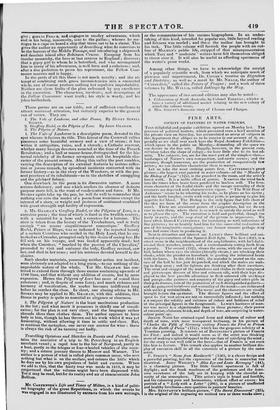Three poems are on our table, not of sufficient excellence
to attract universal attention, but certainly superior to the general run of verses. They are 1. The Vale of Lanlierne, and other Poems, By Heeite SEWELI. STOKES.
1. The Vale of Lanherne is a descriptive poem, devoted to the spot whence it derives its title. This fairest of the Cornwall vallies possesses some beautiful scenery and a view of ocean ; it has within it antiquities, ruins, and a church ; a Catholic convent, whither many foreign devotees resorted at the time of the French Revolution ; and a hall or manor-house,distinguished for the his- torical celebrity of its former occupants and the hospitable cha- racter of the present owners. Along this valley the poet rambles, varying the description of its external features by serious reflec- tion or jocose remark, by episodical incidents connected with its former history—as in the story of the Wreckers, or with the pre- sent practices of its inhabitants—as in the sketches of smuggling and the pilchard fishery.
One drawback to the poem is its discursive nature. A more serious deficiency, and one which renders its absence of definite purpose more felt, is the want of condensation and force. If Mr. STOKES again take up the pen, he will do well to remember that nothing can save the reader of a poem from weariness except the interest of a story, or weight and justness of sentiment combined with great strength and facility of expression.
2. Mr. GRAHAMS Geoffrey Rudel, or the Pilgrim of Love, is a narrative poem ; the time of which is fixed in the twelfth century, with a minstrel for a hero and a countess for a heroine. The story is taken from the history of the Troubadours, and is truly enough " un amour singulirement rotnantique." Geoffrey Rude], Prince of Blaye, was so inflamed by the reported beauty of' a certain Countess who resided in the.Holy Land, that lie em- barked as a Crusader, prompted only by the desire of seeing her. Ile fell sick on his voyage, and was lauded apparently dead; but when the Countess, " touched by the passion of the Chevalier," proceeded to visit and embrace the body, Geoffrey revived, saw her, and died in her arms ; and his mistress devoted herself to the cloister.
Such slender materials, possessing neither action nor incident, were obviously not adapted to a long poem,—to say nothing of the improbable nature of the whole. Yet Mr. GRAHAM has con- trived to extend them through three cantos containing upwards of 1700 lines, and that without any addition of events, but by mere expansion. Hence the Pilgrim of Love has more of sound than substance ; and, in despite of some fancy, and much richness and harmony of versification, the reader becomes indifferent long before lie reaches the close. In short, our closing advice to Mr. STOKES may be applied to Mr. GRAHAM, with this addition, that fitness in poetry is quite as essential as elegance or clearness.
3. The Pilgrim of Nature is the least meritorious production in the list ; and what merit it possesses is chiefly one of versifi- cation; for the plan is not very clear, and the language rather shrouds ideas than clothes them. The author appears to have body in him, though he has thrown out his work whilst it was yet fermenting, without allowing it time to settle and clear. But, to continue the metaphor, one never can answer for wine : there is always the risk of its turning out badly.


























 Previous page
Previous page